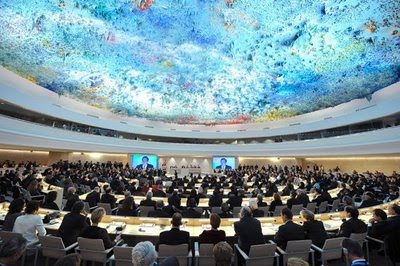United Nations Human Rights Council: 28th Session
Oral statement Item 6 – General Debate
20 March 2015
47 NGOs: Reducing the number of UPR recommendations could weaken the entire process
Thank you. This statement is made on behalf of 47 NGOs.
Mr President,
By the end of the second cycle, over 50’000 recommendations will have been made at the UPR. This figure is impressive. However, according to some actors, this figure is too high: since the beginning of the second cycle, we have heard repeated calls to decrease the number of recommendations made by each Recommending State.
As discussions are emerging on what the third cycle of the UPR should look like, we believe it is misguided to focus on the quantity of recommendations. Indeed, limiting the number of recommendations could be detrimental to the UPR process for mainly two reasons:
- Firstly, if fewer recommendations were made, important issues would be left aside. Only mainstream issues would be raised at the UPR, thus narrowing the scope of the review on a given country;
- Secondly, having many similar or identical recommendations on a given issue demonstrates how important that issue is. Repetition does not overload the State under Review as it calls for similar action but, rather, it shows the concerns of the international community on a specific issue.
Mr. President,
UPR recommendations are the main added value and outcome of the review. Reducing their number voluntarily could, in fact, weaken the whole mechanism. While the number of recommendations has increased, unfortunately, the number of quality recommendations has decreased. The proportion of weak, unspecific recommendations is the main problem we see in the UPR — not the overall number itself. States should make an effort to improve the quality, measurability, and specificity of recommendations, which would better guide implementation.
Thank you.
List of co-signatories:
- AFD international
- Alkarama
- Article 19
- Association pour l’Intégration et le Développement Durable au Burundi-AIDB
- Associazione Comunità Papa Giovanni XXIII
- Cairo Institue for Human Rights Studies
- Canada for Population and Development
- Casa Alianza Switzerland
- Center for the Development of Democracy and Human Rights
- Centro de Estudios Legales y Sociales
- CIVICUS
- Civilis Human Rights and Acción Solidaria on HIV/Aids
- CODAP
- Colombian Commission of Jurists
- Congregation Of Our Lady of Charity Of The Good Shepherd
- CREA
- Defence for Children International (DCI)
- Dominicans for Justice and Peace
- East and Horn of Africa Human Rights Defenders Project
- Edmund Rice International
- FIACAT
- Franciscans International
- Freedom House
- Geneva Institute for Human Rights (GIHR)
- Human Rights Watch
- IIMA – Istituto Internazionale Maria Ausiliatrice
- International Disability Alliance
- International Lesbian and Gay Association
- International Partnership for Human Rights
- International Platform against Impunity
- International Service for Human Rights
- Irish Council for Civil Liberties
- London Legal Group
- Marist International Solidarity Foundation – FMSI
- Minority Rights Group International (MRG)
- Norwegian Helsinki Committee
- Pax Romana
- Plan International
- Save the Children
- Sinergia, Venezuelan Association of Civil Society Organizations
- Stefanus Alliance International
- The Bahá’í International Community
- Together – Scottish Alliance for Children’s Rights
- UPR Info
- VIDES International – International Volunteerism Organization for Women, Education, Development
- Women’s International League for Peace and Freedom
- World Vision International
Share this Post

